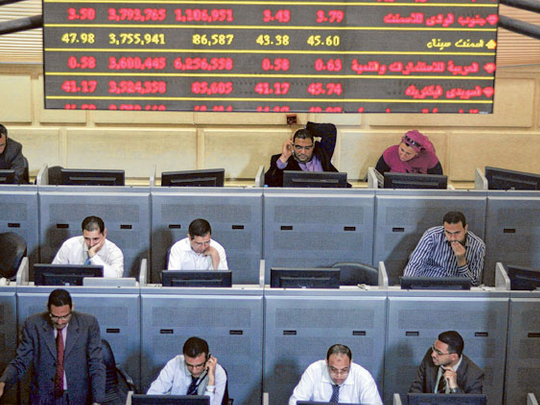
Cairo: Egyptian stocks rise after most Egyptians voted to approve a controversial constitution; the main equities index is back at levels where it was trading before a political crisis erupted over the constitution late last month.
Supporters and opponents of President Mohammad Mursi said their unofficial counts showed the constitution had been approved after two rounds of voting that ended with a final ballot on Saturday.
This does not end political tensions in Egypt; many in the opposition feel Mursi’s action in pushing through the constitution violated the country’s new democracy, and that the document favours Islamists while ignoring the rights of Christians and women. So the vote could be a recipe for further unrest in the long term.
Nevertheless, investors and traders were relieved that the vote was conducted without severe violence. Many believe there may now be enough political stability for the government to focus more on repairing the economy, and on securing aid from the International Monetary Fund.
While some local retail investors sold stocks heavily during the last several weeks of political uncertainty, foreign investors and Arab investors did not, according to stock exchange data, suggesting they remain optimistic about the long-term economic outlook.
The stock index is up 0.2 per cent at 5,452 points in early trade, off a high of 5,505 reached in the opening minutes.
Some blue chips face substantial selling pressure, with Palm Hills Development Co down 3.6 per cent on profit-taking after sharp gains in the past week, and Orascom Telecom off 1.5 per cent.
Citadel Capital initially rose but is now down 2.4 per cent after announcing that its consolidated third-quarter net loss narrowed 13.4 per cent from a year earlier to $22 million.
Egypt’s shares could trade volatile after a constitution drafted by an Islamist-dominated assembly was approved by a majority of Egyptians in a referendum. The Muslim Brotherhood, which propelled President Mohammad Mursi to power in a June election, said 64 per cent of voters backed the charter after two rounds of voting that ended with a final ballot on Saturday. It cited an unofficial tally.
Egypt’s opposition accuses Mursi of pushing through a text that favours Islamists and ignores the rights of Christians, who make up about 10 per cent of the population, as well as women. They say it is a recipe for further unrest.
Cairo’s benchmark index gained 0.4 per cent on Thursday to close at its highest level since November 21 — the day before the country plunged into a political crisis as Mursi expanded his powers. “If the constitution is passed, the political situation will remain in flux — that’s been the case anyway and the market takes it in stride,” says Akber Naqvi, hedge fund portfolio manager at Al Masah Capital. “What’s keeping it afloat is fundamental value beneath it. It may be volatile but people see good entry points.”












